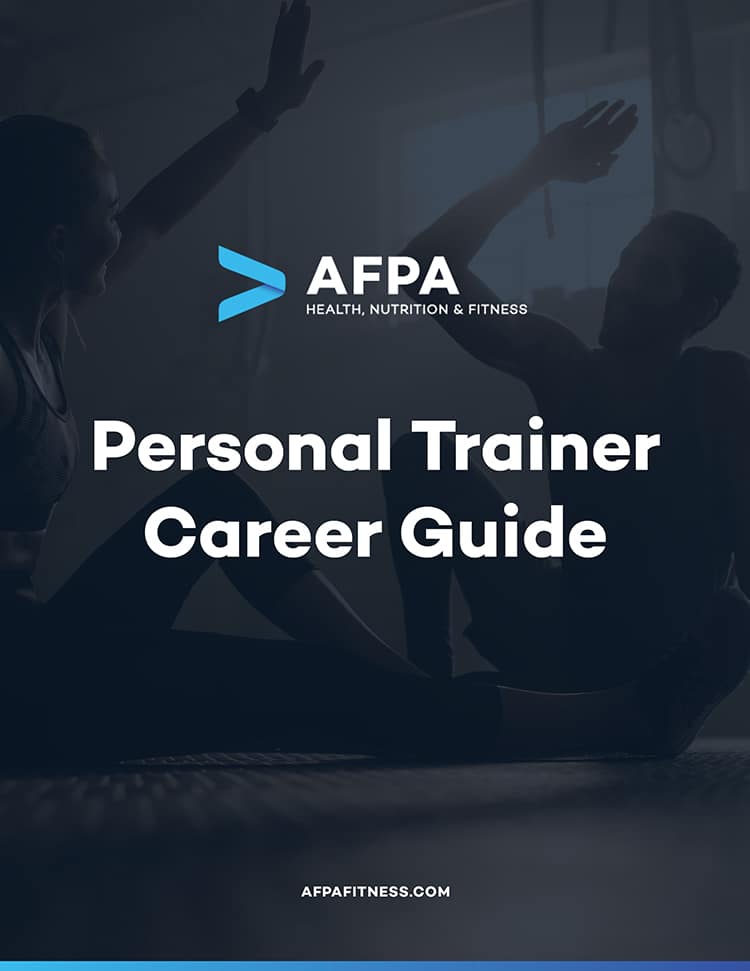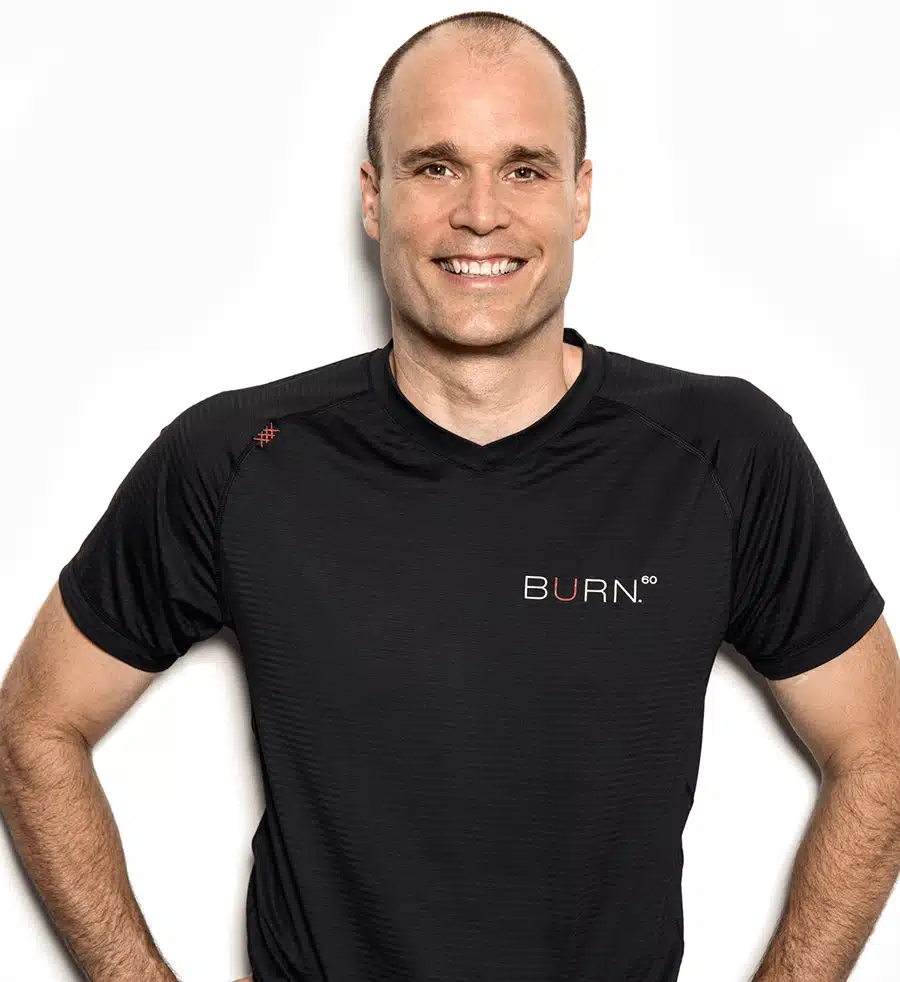Personal Training Certifications
Are you embarking on your journey to become a Certified Personal Trainer? Or looking to level up by specializing in a targeted personal training niche? Our selection of personal training certifications ensures there’s a curriculum for you—no matter your experience or career aspirations.
AS SEEN IN THESE GREAT PUBLICATIONS


Become the Trusted Go-to Certified Personal Trainer
Every AFPA personal training certificate equips you with the confidence, resources, and industry-leading expertise you need to help clients achieve their health and fitness goals. You’ll learn how to design exercise programs (that include an appropriate mix of flexibility training, resistance training, and aerobic exercise), train clients effectively, and provide fitness advice rooted in the latest scientific research.
What Will You Learn
Evidence-Based Exercise Programs
Learn how to apply the principles of exercise science, human anatomy, and biomechanics to craft results-getting exercise programs that’ll help position yourself as the go-to fitness pro in the health and fitness industry. No need to start from zero with every new client, either: Every personal trainer certification program provides dozens of ready-to-use programs you can implement from the get-go.
Injury Prevention and Treatment
Injuries hurt clients’ training longevity and quality of life. Our personal training certificates educate you on everything you need to know about sports medicine so that you can train clients safely—and keep them progressing toward their fitness goals. You’ll also discover injury treatment options that speed up clients’ recovery by alleviating discomfort and restoring function.
How to Get Clients to Make Lasting Behavioral Changes
Getting clients the results they want isn’t simply about fitness training. It’s also about motivating clients so they (actually) stay consistent with their exercise programs long enough to reap their benefits. Every AFPA personal training certification is designed to help you master tried-and-tested behavior change strategies, setting you apart from other personal trainers.
Key Benefits
Turn Your Passion into a Fulfilling, Lucrative Career
The continued growth in the health and fitness industry has increased the demand for fitness professionals with industry knowledge. As an AFPA-certified personal trainer, you’ll be highly sought-after because our comprehensive personal training certifications focus on providing our students with the most robust, updated fitness knowledge. This increases your earning potential. You get to do what you love while earning an income—a win-win situation from all angles.
Learn, Progress, and Get Certified at Your Own Pace
All of our personal trainer certification programs are self-paced. Work through study materials and preparation materials (e.g., study exams) included in our comprehensive training program in 6 months or less. You’ll take your final exam online, saving you the hassle of traveling to a local testing center. Receive your testing results and personal training certificate immediately upon completing and passing your exam.
Gain an Edge Over Other Fitness Professionals
When you become a certified personal trainer with AFPA, you’re not left to figure out how to carve out a space for yourself in the fitness industry. Instead, we help you gain a competitive advantage right away by continuing to prioritize your professional development and growth. Every AFPA personal training certification gives you unlimited access to business resources and guidance, along with opportunities to connect with fitness mentors and the option of specialized credentials (e.g., continuing education courses).
Explore Personal Trainer Certifications
Personal Trainer FAQ
Personal Trainer Certification Requirements Answer
AFPA requires that individuals be at least 18 years of age, have the equivalent of a high school education, and have a sincere desire to help others obtain their fitness and lifestyle goals. Recognized nationally and internationally as a leader in fitness, wellness, and nutrition education and certification, AFPA’s Personal Trainer Certification program sets clear prerequisites to ensure that candidates are prepared to embark on a successful career in personal training.
First and foremost, AFPA emphasizes a sincere commitment to helping others achieve their fitness and lifestyle objectives. This foundational requirement reflects the essence of personal training, where the focus is on guiding and supporting individuals on their fitness journeys. Candidates are expected to possess a genuine passion for fitness and a strong desire to make a positive impact on their clients’ lives.
In addition to the dedication to helping others, AFPA requires candidates to be at least 18 years old. This age requirement ensures that candidates have a level of maturity and life experience that aligns with the responsibilities and professionalism expected of a Certified Personal Trainer.
Furthermore, candidates are expected to have the equivalent of a high school education. This educational threshold serves as the baseline for entry into AFPA’s certification program. While a college degree is not mandatory, candidates should have a solid educational foundation to comprehend the coursework and materials covered in the program effectively.
Once these prerequisites are met, candidates can enroll in AFPA’s Personal Trainer Certification program. This program is meticulously designed to provide comprehensive knowledge and practical skills necessary for success in the fitness and wellness industry.
Why should I become an AFPA Certified Personal Trainer? Answer
AFPA is recognized nationally and internationally as a leader in fitness, wellness and nutrition education and certification. Earning your AFPA Personal Trainer Certification is the first step in gaining the knowledge to successfully train various populations of individuals, gain professional recognition and financial rewards. You will learn all the important information necessary to get you started as a Certified Personal Trainer.
How long does it take to complete the AFPA Certified Personal Trainer program? Answer
Completion time varies by individual and will depend on what certification program you enroll in, educational background, reading and writing skills and efficiency. Most individuals can become a competent Certified Personal Trainer within less than 6 months when studying 7-10 hours a week.
How soon after I enroll can I get started? Answer
Enrollment orders can take up to 24 business hours to process but typically occur much faster. You will be sent an enrollment email with access to the online learning platform and your digital textbooks and can start learning right away!
Who completes AFPA personal training certification programs? Answer
Many people with different backgrounds and education have participated in AFPA certification training programs: doctors, chiropractors, gym owners, college and high school coaches, wellness coordinators, weight loss counselors, non-certified instructors and trainers, and individuals who are currently certified by other organizations. There are no state-by-state regulations for personal training, and your certification is therefore valid in any state and country.
What is the enrollment fee to become an AFPA Certified Personal Trainer? Answer
The price for AFPA Certification varies depending on the certification course chosen. Please review the individual certification courses for the prices. These prices include all course materials and one examination fee.
Do I have to go to a testing site for the final exam? Answer
No. You can complete the final exam on your own desktop or mobile device.
Do I need first aid and/or CPR certification prior to enrolling in a fitness or personal trainer certification program? Answer
No. First Aid and CPR certifications are not required prior to completing your certification program.
Does my certification include professional liability insurance coverage? Answer
Due to the varied nature of the positions held by AFPA professionals, liability insurance coverage is not included with your enrollment fee. Once you complete your AFPA certification, however, you may apply for professional liability insurance with several AFPA-approved insurance providers.
What if I don’t pass the certification exam? Answer
If you don’t pass the certification exam, you may retake the exam for a retest fee of $75.00.
How much time is required to complete the Master Personal Trainer certification program? Answer
You will have up to 2 years total to complete the Master Nutrition Consultant program – 6 months for each of the 4 programs included. The average student takes approximately 400 hours to complete all 4 courses. The hours include reading, listening, watching, note taking, self-assessment quizzes/activities, assignments and the final exam for each program.
The courses included are:
- Personal Trainer
- Nutrition & Wellness Consultant
- Advanced Personal Trainer
- Sports Conditioning Specialist
For details, click here.
How hard is it to become a Certified Personal Trainer? Answer
Becoming a certified personal trainer is a challenging yet achievable goal, and the difficulty of the process can vary from person to person. The journey to becoming a Certified Personal Trainer often depends on individual dedication, prior knowledge, and study habits.
While becoming a certified personal trainer is attainable, it does require a commitment to studying and understanding the course material. The self-paced nature of AFPA’s programs, along with the opportunity for a retest, provides candidates with the flexibility to overcome challenges and successfully earn their certification. Ultimately, with dedication and effort, individuals can achieve their goal of becoming a Certified Personal Trainer.
How fast can I get my personal trainer certification? Answer
The speed at which you can obtain your AFPA Certified Personal Trainer certification depends on several factors, including your individual circumstances, educational background, study habits, and commitment. However, most individuals can achieve certification competence in less than six months when dedicating 7-10 hours of study per week.
The flexibility of the AFPA Certified Personal Trainer program allows candidates to progress at their own pace. This means that completion time can vary widely from person to person. It’s important to consider your educational background and reading and writing skills, as these can influence how quickly you grasp the course material.
If you are dedicated and commit to consistent studying, it’s entirely feasible to become a competent Certified Personal Trainer in a relatively short timeframe. Setting aside 7-10 hours per week for study and coursework is a reasonable guideline for achieving this goal.
What qualifications do I need to be a personal trainer? Answer
To become an AFPA Certified Personal Trainer, you need the following qualifications:
- High School Education: You should have at least a high school diploma or its equivalent.
- Age Requirement: You must be at least 18 years old.
- Desire to Help: A sincere desire to help others achieve their fitness goals is essential.
- AFPA Certification: Complete AFPA’s certification program, which covers key topics and practical training.
- Pass Certification Exam: Successfully pass AFPA’s certification exam to demonstrate your competence.
These qualifications ensure you have the knowledge, skills, and commitment to excel as a Personal Trainer through AFPA, a respected organization in the fitness and wellness industry.
How much does it cost to get CPT certified? Answer
The cost of obtaining a Certified Personal Trainer (CPT) certification can vary depending on several factors. The primary factors that influence the cost include the certifying organization chosen and any additional study materials or resources a candidate may need. On average, the certification program itself can range from $500 to $900. However, some programs may cost more or less.
Candidates should also budget for study materials, such as textbooks and online resources, which can add a few hundred dollars to the total cost. Additionally, the certification exam fee, which is sometimes a separate cost, ranges from $200 to $500, depending on the certifying body. It’s essential to consider these costs when planning to become a certified personal trainer and to explore any available discounts or financial aid options, as some organizations offer scholarships or payment plans to help aspiring trainers manage the expenses.
When you enroll in AFPA’s Personal Trainer Certification program, all study materials, including lifetime access to digital textbooks and online resources, as well as your final exam cost are included.
Ultimately, while pursuing certification can require a financial investment, it’s a valuable step toward a fulfilling career in fitness.
What are the cons of being a personal trainer? Answer
While a career as a personal trainer offers numerous rewards, it also comes with its share of challenges and drawbacks. One of the primary cons is the irregular income. Many personal trainers work on a freelance basis or are employed in part-time positions, which can result in an inconsistent paycheck.
Additionally, building a client base and establishing a reputation in the field can take time and effort, making it challenging for beginners to secure a stable income. The physically demanding nature of the job can also be a drawback, as trainers often need to demonstrate exercises and spot clients during workouts, which can lead to fatigue and the risk of injury.
Managing and retaining clients can also be challenging, as individuals may have different fitness goals, preferences, and schedules.
Lastly, personal trainers often work early mornings, evenings, and weekends to accommodate clients’ availability, which can impact work-life balance.
Despite these cons, many trainers find the rewards of helping clients achieve their fitness goals to be personally fulfilling and motivating.
Is there such a thing as a license to be a personal trainer? Answer
Personal trainers are not “licensed” practitioners. You can conduct your training business how you choose, keeping in mind the AFPA Code of Ethics.
How do you train personal training clients online? Answer
Training personal training clients online requires a different approach compared to in-person training but can be equally effective with the right strategies. To start, trainers need to establish a strong online presence through a website or social media platforms to attract potential clients. They can offer virtual assessments through video calls to evaluate clients’ fitness levels, goals, and limitations. Based on this assessment, trainers design personalized workout plans and nutrition guidance. Communication with clients is key, and trainers should maintain regular contact through video calls, emails, or messaging apps to track progress, provide feedback, and answer questions.
To ensure clients are performing exercises correctly, trainers can create instructional videos and share them with clients. Clients can record their workouts and share them with the trainer for form correction. Additionally, trainers may use fitness apps and software to monitor clients’ progress and adjust their programs accordingly. Online personal training also involves motivating and holding clients accountable, which can be done through setting goals, tracking achievements, and providing encouragement.

PROGRAM GUIDE
Personal Trainer Career Guide
Download our comprehensive Personal Trainer Career Guide to learn everything you need to know about the industry, career opportunities and AFPA’s curriculum.






